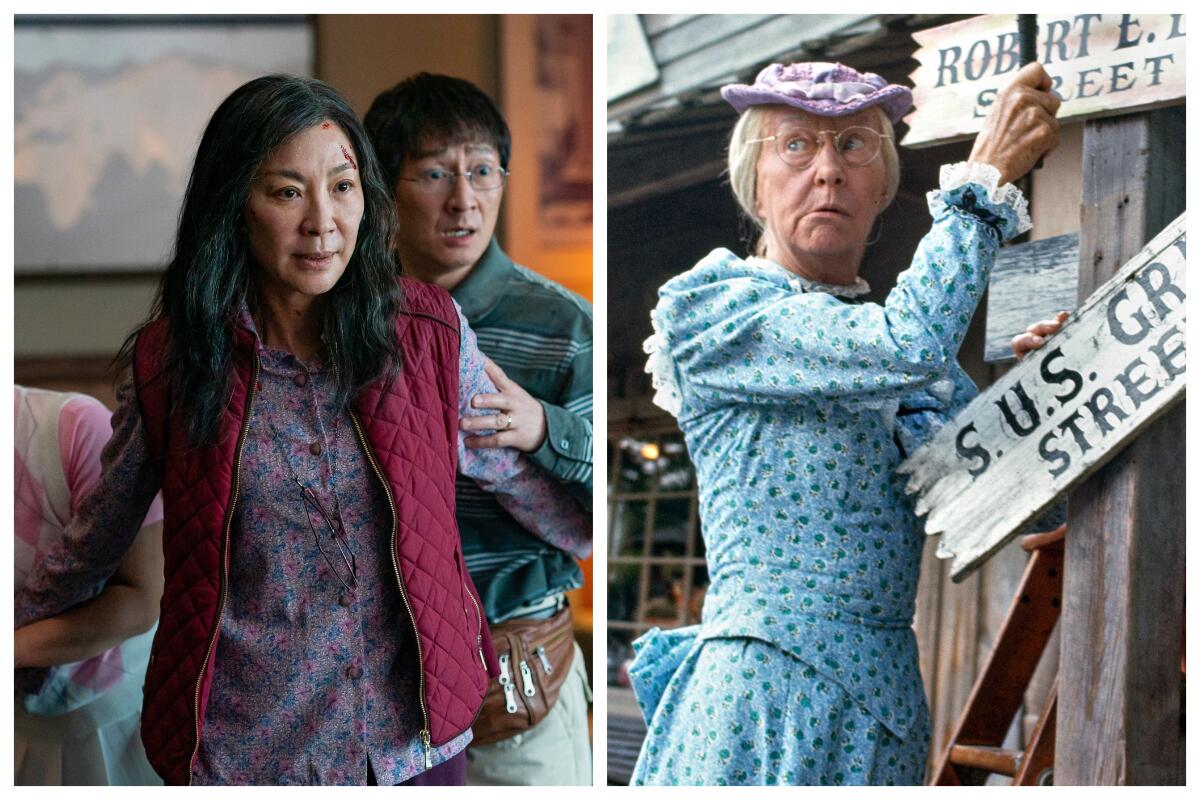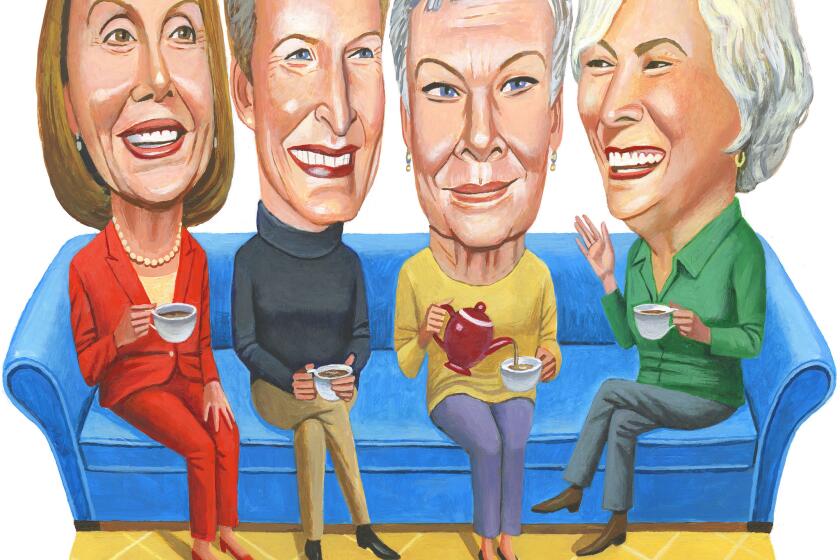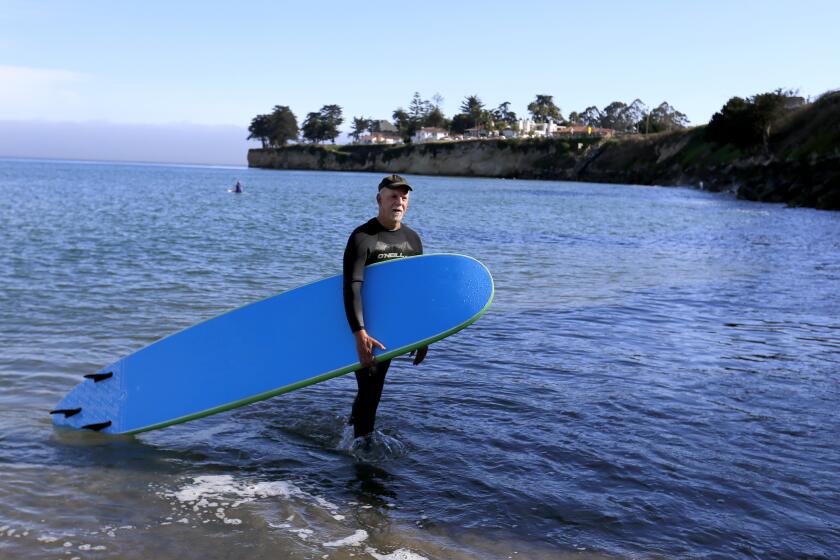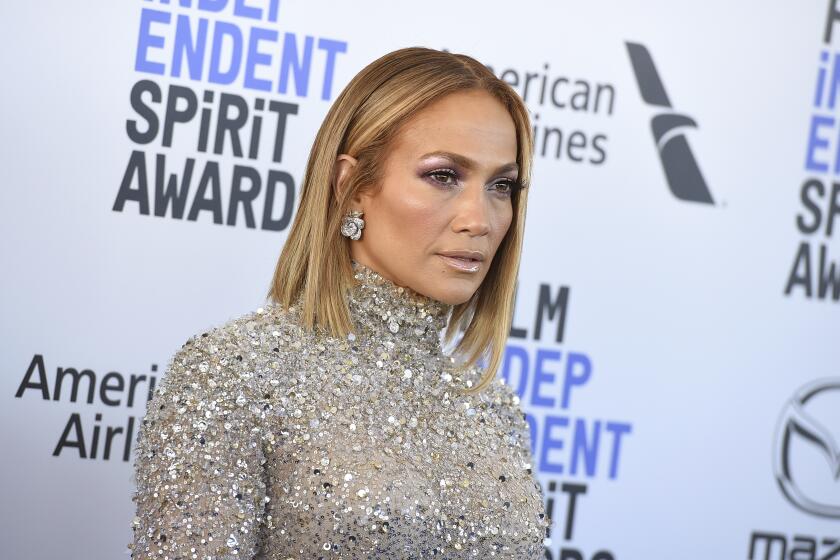60 isn’t the new 40 and that’s fine by me

- Share via
I just turned 60, which seems, in equal measure, simply impossible and no big deal.
No matter how you look at it, 60 is a big number — 10 more push-ups than anyone should ever be asked to do — situated inarguably on the back end of even the modern female lifespan. I could continue to call myself middle-aged, but even if it were possible, do I want to live to be 120? No, I do not.
But honestly, how can I be 60 when I still don’t know how to apply foundation or fold a fitted sheet? When my idea of a perfect meal is graham crackers and peanut butter, and my notion of “tidying” is putting the books that cover every surface of my home into a stack and calling it a day?
I am grateful to be alive, especially after a pandemic, but I certainly don’t feel wiser, calmer, more at ease with myself or any of the other wonderful feelings others have documented as they enter their seventh decade.
Nor do I feel lonely, more afraid of death or out of touch with popular culture or digital technology. Having two young-adult children and one teenager certainly helps — not only do they force me to at least try to keep up with music and TikTok trends, it’s tough to feel near death when your kids regularly address you as “bruh,” “girl,” “queen” or the endearment form of “b—” (almost always followed by an immediate “oh, sorry, Mom”).
“Wow, wow, wow, fellas; look at the old girl now, fellas.”
If I have to occasionally Google their latest form of slang; I do know how to use my smartphone, including (and for the record) how to turn the flashlight off.
OK, I only use one thumb while texting and sometimes take what is considered “too long” to use the search function of the Fire TV Stick, but I also know how to write an actual check and use postage stamps and I’m apparently the only one in our family who can access all our various passwords.
Sure, I’ve got a knee that acts up, but that thing has been acting up since I dislocated my knee cap while drunkenly dancing at a college party (don’t ask). And, of course, I’m tired — we’re all tired — but not as tired as I was when I had two young children in my late 30s or an infant and two only slightly older kids in my early 40s.
I would like to think I am now old enough to blithely cut in line as I have admiringly watched old ladies do all my life, but my children assure me, in horrified embarrassment, that I am not.
The only thing that has really changed is the nature of the ads popping up on my digital media platforms. How many times a day do these algorithms think I need to be persuaded that 60 is the new 40 while being offered miracle cures for crepey skin, age spots and, my personal favorite, apron belly? I wish I could say I am unfamiliar with these conditions but even so, I don’t appreciate being promised that the “secret” to tightening aging skin or reversing menopausal weight gain is a mere click away.
Sixty is not the new stupid.
California is about to get walloped by an aging population wave. Steve Lopez’s new column will focus on the blessings and burdens of growing older.
Having lived life with a thousand freckles, I know skin is going to do whatever the hell it wants to do, and when I recently decided I had gotten a bit too fat, I managed to lose weight by employing the breakthrough diet of staying away from sugar and eating less.
Menopause certainly causes some startling weight redistribution — sometimes I swear I could see the fat fleeing my thighs and butt for the warmer climes of my midsection. But in my case, the gain was the direct result of a conscious decision: If I had to endure the nightmare of migraines, heart palpitations, hot flashes and insomnia, then I was definitely entitled to eat cinnamon buns whenever I felt like it and at least three Snickers Minis at bedtime.
I mean, that’s just science.
As for 60 being the new 40, this is numerically absurd. There is not enough Spanx in the world to compress two decades into nothingness. I own each and every year I have lived on this planet, even those I would rather not remember. Especially those I would rather not remember.
Anyway, it’s not so much that 60 is the new 40 as it is that 60 is finally allowed to be just 60. Especially for women.
I grew up at a time when women who were not, say, 27 or younger, did not “admit” their age because age was a sword of judgment. Forty was bad, 50 was worse and 60, well, that was considered instantly and irrevocably old. At 60, women were expected to resign themselves to getting nothing but talcum powder and soap sets for their birthdays and watching everyone else have all the fun.
Those who were vocally opinionated could choose between being considered cantankerous or formidable. The rest were assigned some version of grandma. Even those who were not actual grandmothers.
There were exceptions, of course, there are always exceptions, but culturally, at 60, women were expected to fade — into caricature, into caretaking or just into the background.
Everywhere women looked in popular culture, this assumption was drastically underlined. Irene Ryan was 60 when she began playing Granny on “The Beverly Hillbillies” and if there was an older-appearing character in the history of television, that character was a zombie.
Years later, “The Golden Girls,” a show that traded on the radical notion that older women had lives too, defined “older” mostly as late 40s and early to mid 50s. (Estelle Getty was 62 when the show began, playing 79.) Male actors could play romantic leads well into their 70s but throughout much of film history, most 50-plus female actors were consigned to playing someone’s grandmother or crazy great-aunt — Bette Davis was 54 when she starred in “What Ever Happened to Baby Jane?” That’s four years younger than Sarah Jessica Parker, currently resurrecting Carrie Bradshaw in “And Just Like That.”
As a woman who never had to fight for the right to vote, attend college, procure legal birth control or enter my chosen profession, I am grateful on a daily basis for those brave, brilliant, stubborn women who did the hard work for me. And now I feel the same way about 60.
These days no one would suggest that Julia Louis-Dreyfus, who is 62, could only play grannies any more than they would say that Tom Cruise, 61, should stop parachuting off cliffs. The 21st century version of “The Golden Girls” is “Grace and Frankie,” starring Jane Fonda and Lily Tomlin, who are both in their 80s. The cutest TV couple of the year, hands down, is Meryl Streep, 74, and Martin Short, 73, on “Only Murders in the Building.” The indefatigable Dolly Parton and Debbie Allen are 73; Oprah Winfrey is 69; Julianne Moore and Tilda Swinton are 62; Michelle Yeoh is 61; and Vanessa Williams and Lisa Kudrow joined me in turning the big 6-0 this year.
Yeah, that’s right, I’m the same age as Vanessa Williams. I will show you my driver’s license.
That is just an abbreviated list, and outside Hollywood, the examples of women defying the traditional definitions of “old” are even more numerous. Credit baby boomers, feminism, the fitness movement, Eileen Fisher or even the rise in Botox and cosmetic surgery; 60 is no longer the beginning of the end.
Certainly credit all the women who refused to accept 60, or 70, or 80 as anything but a number.
Ageism still exists, of course, but at least now it has a name (as opposed to, you know, “life”) and, in some cases, the hope of legal recourse. The lack of financial safety nets, including retirement plans, in this country forces too many people to choose between lives of perpetual work or poverty (and in some cases does not offer the choice of perpetual work). Just as a lack of good affordable housing and healthcare can turn increased age into increased vulnerability, especially in Black and brown communities.
But age itself no longer forces people, especially women, to assume certain limited roles, to feel that they must stop being who they are because the calendar year has changed or fade because society tells them to.
Being 60 is just being 60. It feels a lot like being 50, only better — no menstrual cramps or hot flashes.
I’m not too old to learn to apply foundation or fold fitted sheets. But when you have a thousand freckles, foundation never works anyway, and I have never seen the point in folding fitted sheets — I’ll just keep shoving them in the pillow case like I’ve been doing for 40 years.
More to Read
The biggest entertainment stories
Get our big stories about Hollywood, film, television, music, arts, culture and more right in your inbox as soon as they publish.
You may occasionally receive promotional content from the Los Angeles Times.













